SEMA Member News—March/April 2011
 The staff and membership of SEMA and the HRIA can have a direct impact on safeguarding the tradition of hot rodding in America through the SEMA Hot Rod Bill. (Photo Courtesy Dennis Overholser) |
|
In many states, legislation—or the lack thereof—has created difficulty for titling and registering classic and custom vehicles. Almost all states have processes by which antiques can be registered, but few adequately provide for modified cars. In response, SEMA’s government affairs team has developed a model bill to protect hot rodding for current and future generations. Working with hobby-friendly legislators, this model legislation creates titling and registration classifications for street rods and custom vehicles, including kit cars and replicas.
Under the SEMA model, eligible vehicles are titled with the production year they most closely resemble. They must meet only the equipment requirements for that model year and are exempt from periodic vehicle inspections and emissions inspections. Beginning with Illinois in 2001, versions of the model bill have been successful in helping hobbyists title their rods in 21 states to-date. SEMA continues to work toward adding more states to that list. A copy of the bill is available on the SEMA Action Network grassroots enthusiast website.
States that have enacted the SEMA Hot Rod Bill include Arkansas, California, Colorado, Florida, Hawaii, Idaho, Illinois, Iowa, Maine, Massachusetts, Missouri, Montana, Nevada, North Carolina, Oregon, Rhode Island, Tennessee, Utah, Virginia, Washington and Wyoming.
Member Spotlight: Classic Instruments
|
|
|
The company is owned by John McLeod, a lifelong hot rodder and member of the HRIA Select Committee. Like many hot rodders, McLeod is also a drag racer at heart. His first hot rod was a ’64 Plymouth Fury Max Wedge. These days, you will find him taking part in nostalgic drag races whenever he finds an open weekend. Like most HRIA members, McLeod is more than a business owner—he is actively involved in promoting the hobby and industry of hot rodding through his own passion for classic hot rods as well as his personal involvement in SEMA and HRIA.
The involvement of kids in hot rodding is also a passion for McLeod and Classic Instruments. McLeod believes that we can help preserve our hobby and industry for years to come by exposing the next generation of car enthusiasts to classic hot rods and musclecars. He is actively involved in promoting junior drag-racing programs in the Michigan area as well as youth involvement at national car shows and local events. Classic Instruments also provides tours and educational opportunities for local teens so that they are exposed to the hot-rodding community.
If you have questions about getting involved in HRIA and youth involvement programs, McLeod is always available to talk, or you may contact Kerry Hopperstad, chairman of the HRIA’s Youth Involvement Task Force.






